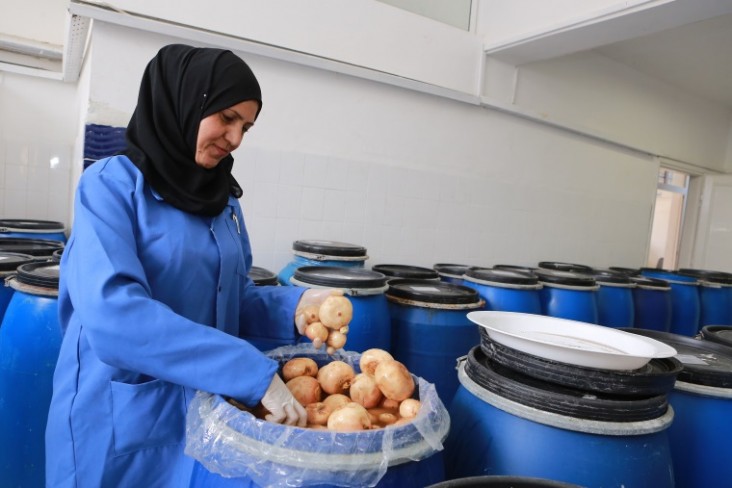Speeches Shim
Background

Jordan faces critical challenges to preserving the development gains of the past two decades. Regional turmoil and stalled economic growth have driven GDP growth rates from eight percent in 2008 to less than three percent since 2010. Furthermore, a growing refugee population has exerted pressure on already overburdened infrastructure, social services, employment, and scarce natural resources.
There is a critical need for economic development efforts in Jordan to more effectively reach micro and small enterprises (MSEs) and impoverished regions in order to benefit women, youth, and vulnerable populations. MSEs constitute 90% of all businesses in Jordan and employ over 50% of the Jordanian workforce. They often lie at the heart of individual, family and community livelihood within vulnerable populations.
Unfortunately, these enterprises face numerous constraints to growth, including an unsupportive policy environment, challenges accessing finance, and an inadequately trained workforce. The World Bank’s 2012 “Doing Business” report ranked Jordan 106th out of 183 countries in terms of an enabling environment for small and medium-sized enterprises (SMEs).
Project overview
USAID LENS is a five-year project encouraging the long-term economic growth and development potential of underserved communities by combining local economic development efforts with private sector initiatives. LENS applies this approach through the following activities:
- Strengthening local economic networks: LENS facilitates links between MSEs, consumers, business service providers, chambers of commerce, financial institutions, CBOs, municipal/governorate authorities, and government ministries. By building these linkages, LENS projects the growth of local economic systems and gauges public and private sector support.
- Building stakeholder capacity: LENS pursues the sustainable growth of MSEs and entrepreneurs by raising awareness of available resources, improving access to financing, and giving microfinance institutions and business service providers the tools and techniques to better serve MSEs. LENS also builds the capacity of local government to develop and implement competiveness strategies that result in economic growth and increased investment.
- Improving the enabling environment: The project works to reduce barriers to local economic development, especially policies that inhibit the expansion of local economic networks or impede market entry, sustainability and growth for MSEs. To achieve this, the project helps local authorities streamline mechanisms, clarify roles and responsibilities, and introduce best practices for local economic development.
The project operates in the governorates of Irbid, Zarqa, and Amman (outside of the Greater Amman Municipality). It is currently expanding to Aqaba and Tafileh and will soon expand to Karak.
Activities
- Supporting MSEs from promising sectors and business service providers through a $10 million grants program, which aims to reach 500 MSEs in 2015 to help them start up and grow.
- Using grants/technical assistance to strengthen local government institutions tasked with fostering economic development.
- Improving the business registration process for MSEs by collaborating with the Ministry of Industry and Trade (MoIT) and the Companies Control Department (CCD). This includes upgrading CCD server storage capacity to handle more data for registered businesses, enabling MoIT and CCD employees to coach start-ups, and developing a business registration manual to help MSEs select the best company type when registering their business.
- Working with at least three business service providers in the tourism and food processing sectors to:
- Create a cluster of community-owned and managed tourism micro enterprises through a woman-owned business service provider
- Improve the productivity and quality of olive production in target governorates
- Help beekeepers address market gaps, market and brand their products, improve services, and attract new members to beekeepers associations
- Helping MSEs in the transport sector comply with new local and international transport regulations through a nation-wide trainer certification program.
- Engaging several business service providers with the aim of improving MSE competitiveness.
- Supporting the migration of the credit information database to the Jordan Microfinance Network (Tanmeyah) to help combat willful default, over-indebtedness, and enhanced sector reporting.
- Working with microfinance institutions to create an SME unit, improve risk/knowledge management systems, develop the ability to receive client repayment via mobile phone, and establish mobile branches/a kiosk network.
- Supporting 10 partner municipalities in conducting public-private dialogues to identify economic development opportunities and drive public-private partnerships at the local level.
IMPACT
- Signed a memorandum of understanding with Safeway Jordan to integrate food producers/processors of pickled vegetables and processed dairy products into the supermarket’s supply chains. Expected results include increased productivity, reduced post-harvest losses, increased technical capacity among agro-MSEs, improved product range and quality, improved marketing, and additional income for producers.
- Issued four annual program statements and request for application mechanisms under the grants program to directly support MSEs, including new businesses and business service providers, and support lead firms in key value chains.
- Issued three annual program statements targeting new businesses, established businesses, and business service providers in target governorates in order to directly support MSEs in meeting different needs.
- Completed an extensive survey of MSEs in the governorates of Irbid, Zarqa and Amman. As the first of its kind in Jordan, the survey supports the project’s evidence-based approach to intervention design. The project is also preparing surveys in Tafilah and Aqaba in tandem with the project’s expansion to those governorates.

Comment
Make a general inquiry or suggest an improvement.